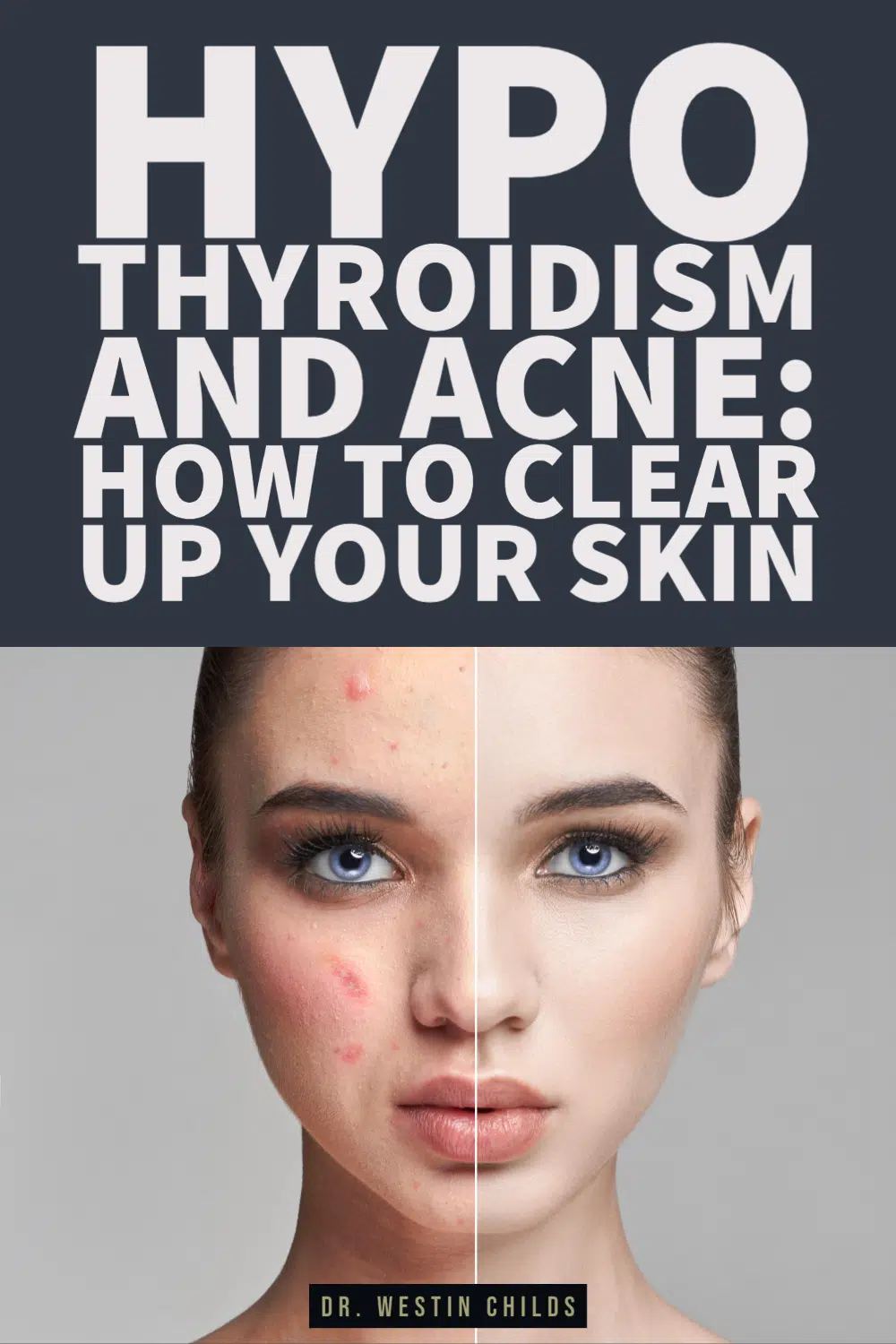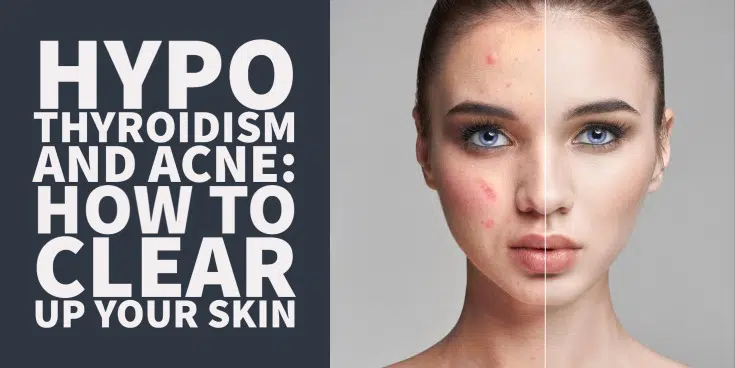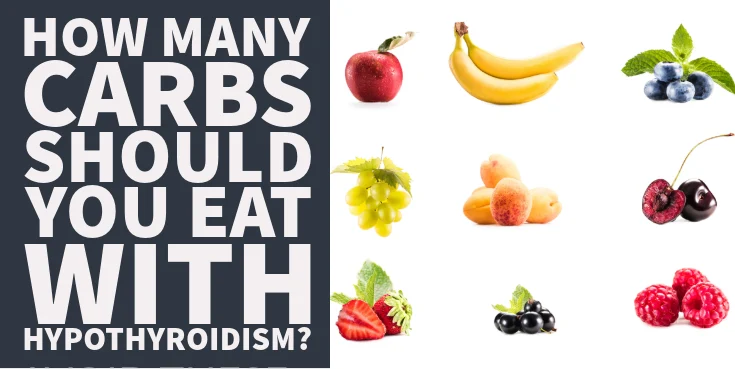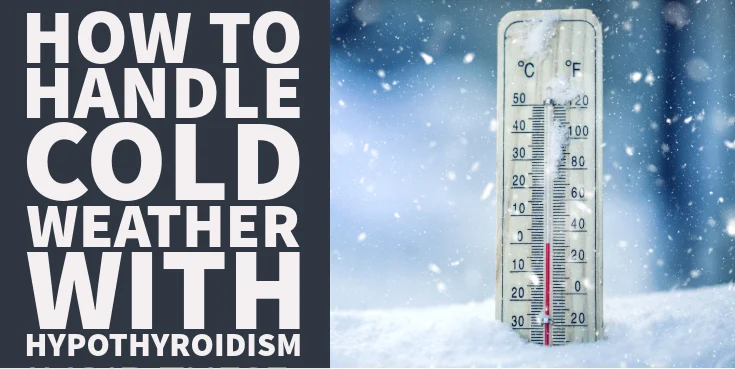Acne can be tricky to treat unless you know exactly what is causing it.
And figuring that out can be a problem – especially if your approach has been to just throw different kinds of lotions and creams all over your skin.
You see:
Acne is a condition that usually reflects a problem that is happening inside of your body, not what is happening to your skin directly.
So if you approach the problem as one that can be solved with topicals and creams, you may never actually treat the root cause of your acne.
In fact, one of the most common reasons for acne that I’ve seen is due to thyroid hormone imbalances.
Yes, other hormones can cause acne (we will talk about those as well) but thyroid problems tend to be more tricky to diagnose and treat so patients with this kind of acne tend to stick around for a while.
In this article, I’m going to walk you through the best treatments that I’ve found to treat acne, from the inside and the outside…
Is Your Acne Hormonal?
If you’ve been suffering from acne by now I’ll bet that you’ve done research on what you can do to clear your skin.
You’ve probably tried multiple skin care products, lotions, creams, gels, etc.
What you might not have realized is that if your acne is due to a hormonal imbalance then placing topical creams and gels on your skin will most likely NOT reduce your acne.
So the question then becomes, what is actually causing your acne?
When it comes to hormones everyone is aware of the “traditional” hormonal acne: breakouts on your jawline or hairline and very oily skin (usually accompanied by excess hair growth).
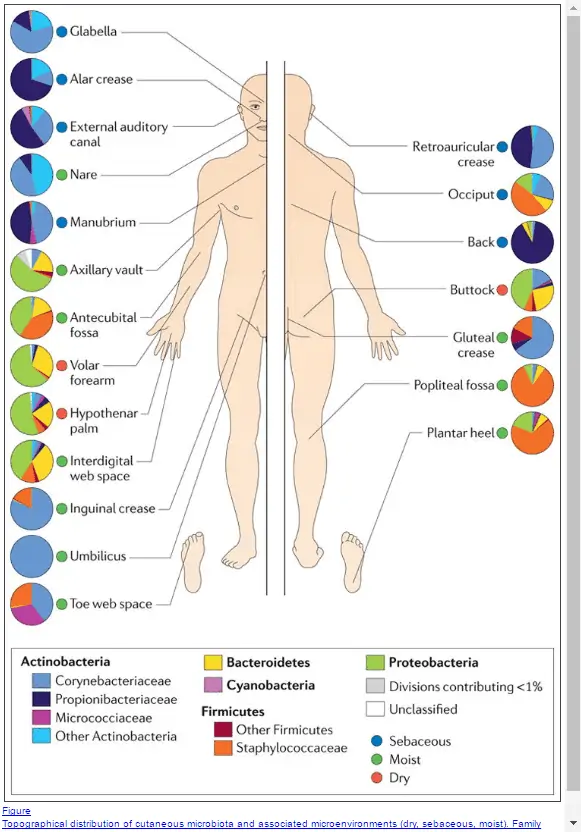
This type of pattern is usually attributed to estrogen/progesterone imbalances.
That’s why pharmaceutical companies target birth control pills as a potential treatment for acne.
And the crazy part is they do sometimes work, but usually, they stop working at some point (and this is usually when patients come to see me).
I want to make a point here to say that while yes estrogen/progesterone imbalances can certainly lead to acne and breakouts – I think that acne due to hypothyroidism (1) is MUCH more common.
And this becomes a problem because hypothyroidism is missed and/or mismanaged ALL the time.
It’s also VERY common with a prevalence of around 5-10% of the population (2) (depending on which study you look at).
So if your acne is due to hypothyroidism and you are taking birth control pills to try and fix it, it will never go away.
Not only that but remember that hypothyroidism leads to a number of hormone imbalances that could each lead to acne by themselves.
Hypothyroidism causes:
- Low progesterone levels lead to estrogen dominance and high estrogen levels (3)
- Influences insulin levels which may influence testosterone levels (4) leading to testosterone-induced acne and oily skin
The main issue in these conditions is the underlying cause which is usually hypothyroidism.
This means that in order to properly treat acne if it is due to hypothyroidism is to boost thyroid function either naturally or with the addition of thyroid hormone.
DOWNLOAD FREE RESOURCES
Foods to Avoid if you Have Thyroid Problems:
I’ve found that these 10 foods cause the most problems for thyroid patients. Learn which foods you should avoid if you have thyroid disease of any type.
The Complete List of Thyroid Lab tests:
The list includes optimal ranges, normal ranges, and the complete list of tests you need to diagnose and manage thyroid disease correctly!
Hypothyroidism and Acne
How do you know what is causing your acne?
Well, that can get tricky and it does require some investigative work.
I will generally order all hormones when evaluating patients for acne and other symptoms.
Usually, the main complaint isn’t acne by the time someone comes to see me, but it is usually pretty high up on their list of important things they want to get taken care of.
I’ve noticed that acne from hypothyroidism has a few characteristics:
- It usually resolves or improves with the addition of thyroid hormone
- It’s usually cystic in origin (hypothyroidism causes cystic acne)
- It’s usually not cyclical – it’s just present all the time (but may get worse due to times of stress)
- Generally not associated with the menstrual cycle
- Generally accompanied by multiple other symptoms: fatigue, weight gain or weight loss resistance, changes in nails and hair (brittle/dry/etc.)
- The acne may be distributed over your entire body (not just localized to the face)
If your acne follows this pattern then it may be due to hypothyroidism and NOT another hormone imbalance.
Though it’s worth pointing out that hypothyroidism can make hormonal acne worse as well if not treated appropriately.
I’m going to go over what to do if you believe your acne is due to hypothyroidism at the end, but first, we need to talk about GI function and acne.
Acne and the Gut
Another huge and often overlooked cause of acne is gut imbalances or issues in the GI tract.
It turns out that changes in the bugs in your gut can lead to changes in your skin, including acne (5) (but also many other skin conditions).
And here’s where things get interesting:
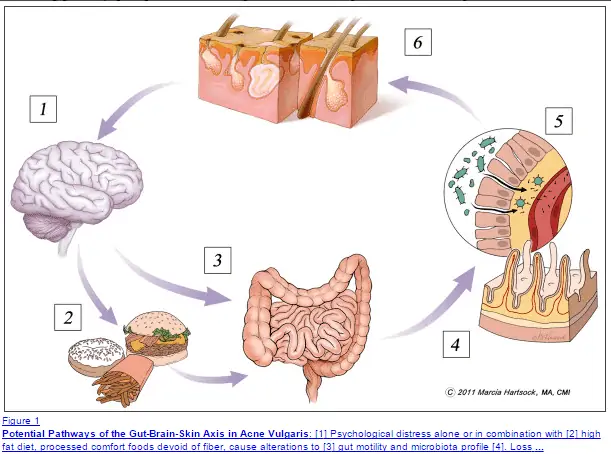
Hypothyroidism frequently leads to a condition known as SIBO.
As many as 50% of hypothyroid patients (6) may have this condition (without knowing it).
So now we have a triple whammy:
Hypothyroidism itself can cause acne by itself.
Hypothyroidism can lead to hormonal changes that can lead to acne.
Hypothyroidism can cause changes in the GI tract or gut that lead to acne.
Do you see the common denominator here? (No, we aren’t going back to math…)
This is how hypothyroidism may be wreaking havoc on your skin and leading to acne.
The next step is obviously figuring out how to treat the problem…
5 Steps to Treating Acne
The treatment of your acne will largely depend on what is causing it.
Let’s say your problem is hypothyroidism but you also have GI issues contributing to your acne.
In this, case you would need to address the hypothyroidism and address the gut issues as well.
Generally treating the thyroid by itself may not be enough if multiple imbalances are contributing.
Having said that let me go through how I treat acne in my clinic including the steps you need to take next if you aren’t sure where your acne is coming from:
1. Treat Hypothyroidism if present
How do you know if your acne is caused by hypothyroidism?
Follow the guidelines above:
Generally, this type of acne follows a particular pattern and is associated with other systemic symptoms (listed above).
The problem becomes how do you know if this is the case?
You need to run the proper tests and then you need the proper treatment:
I’ve written extensively on how to diagnose hypothyroidism through lab tests (and why lab tests really aren’t the best way to diagnose hypothyroidism) which you can read about here.
But as a quick primer below is the list of tests you need to properly evaluate your thyroid:
- TSH – Your TSH should be < 2 (anything higher is a problem and anything lower is not necessarily normal)
- Free T3 – If not on medication this should be in the upper 50% of the reference range
- Free T4 – If not on thyroid medication this should be in the upper 50% of the reference range
- Reverse T3 – Should be < 15
- Sex hormone binding globulin – If not on birth control medication it should be in the 70-80 range (note that OCP will make this test less reliable)
- Thyroid antibodies (especially important to evaluate for Hashimoto’s!) – These should be as close to zero as possible
If you fall outside of these ranges AND you are symptomatic then your acne may be due to hypothyroidism.
If that’s the case then treatment would include naturally increasing your T3 and hormone levels or taking thyroid hormone.
You can find a post on how to naturally increase your thyroid function here.
For many of you, you will probably need thyroid medication to fix your acne.
If you carry a diagnosis of hypothyroidism and you are currently being treated with Levothyroxine, then you may ultimately benefit from switching to a medication that contains T3.
Often times patients do not convert T4 to T3 very well and despite being “treated” with T4-only medications (like levothyroxine and Synthroid) their target tissues may not be getting the proper amount of thyroid hormone.

If that is the case then switching to medications like Nature-throid, Armour thyroid, NP thyroid, or WP thyroid may be best.
It’s also possible that other factors may be playing a role in your acne (which we will go over below) so don’t get down just yet.
2. Balance Progesterone and Estrogen Levels
The second place you want to look is directly at your estrogen and progesterone levels.
Specifically, I’m talking about your estrogen/progesterone ratio.
Generally the higher your level of estrogen (either in the serum or at the receptor level (7)) the more likely you are to develop acne.
If you have hypothyroidism (especially if you have hormonal issues like PMS/PMDD) then an important part of treating your estrogen/progesterone levels will be treating your thyroid properly.
Most women know if their acne is due to hormonal issues because it tends to come and go with their cycle, and their mood, and it is in a very distinct distribution on the body.
The main priority then becomes treatment:
If high estrogen levels make your acne worse then you need to focus on balancing your progesterone levels and increasing the metabolism of estrogen in your body.
This will allow you to simultaneously bring down your estrogen while you bring UP your progesterone.
So how do you do this?
- Focus on foods that help metabolize estrogen down the “protective” 2-OH-estrone pathway (8) – You can do this by eating cruciferous vegetables which are high in indoles (9) that help your body get rid of estrogens
- Consider supplementing with indole 3 carbinol or DIM to improve estrogen metabolism
- Support liver function and metabolism
- Make sure you don’t have methylation issues and if you do then consider supplementation (methylation is required for proper estrogen metabolism)
- Consider adding bio-identical progesterone to your regimen (do not take if currently taking OCP)
3. Balance Androgens (Testosterone and DHEA)
Androgens include DHEA, testosterone, and testosterone metabolites.
Women with high levels of any of these may present with acne (10), oily skin, and changes in mood or behavior.
What you may not have realized is how to properly treat testosterone issues.
Most of the time high testosterone in a woman is due to changes in insulin levels.
High insulin = high testosterone = acne
So the treatment of acne due to high testosterone is usually directed at the underlying cause – in this case, high insulin levels.
Women who fall into this category usually know because they have signs and symptoms of PCOS in addition to acne:
Extra hair growth on the face, discoloration of the skin (usually dark), changes in mood, weight gain or weight loss resistance, and acne.
You can check to see if your insulin is playing a role in your testosterone levels by simply checking both in the serum:
- Total testosterone – Should be in the middle of the reference range if you have acne
- Free Testosterone – Should be in the middle of the reference range if you have acne
- Fasting insulin – Should be < 5 (higher levels indicate issues with insulin regulation)
The treatment then comes addressing insulin resistance and improving testosterone metabolism AWAY from the DHT (the most potent androgen).
Treatment for acne due to high testosterone:
- Consider supplements designed to metabolize testosterone AWAY from DHT: Zinc + Saw palmetto
- Consider supplements designed to address insulin resistance: Alpha lipoic acid, Berberine, and Chromium
- Address high insulin with intermittent fasting and a low-carb diet (high in healthy fats)
4. Consider Supplements to help nourish the Skin
While there are many reasons for acne there is no denying that many people have basic nutrient deficiencies that can be preventing the proper function of the skin.
These can come from a variety of reasons (including malabsorption, hormone deficiencies, poor diet, etc.) – but the point is the same:
Your skin requires certain nutrients (11) to function properly and deficiencies in nutrients can lead to acne.
This may explain why changes in diet can improve acne (by providing these basic nutrients in the form of food).
It’s also why you see certain supplements being touted as the BEST natural acne supplement.
While there is no “magical acne cure” if you have acne it is certainly worth trying these supplements to see if it improves your skin:
- Zinc – Zinc plays a key role in skin health and many patients are also deficient. It can help boost the immune system, acts as an anti-inflammatory, and also helps testosterone metabolism.
- Omega 3 fatty acids + FCLO – Omega 3 fatty acids help reduce inflammation and have been shown to reduce inflammatory acne in some studies (12).
- Vitamin A – Vitamin A deficiency is probably one of the most common nutrient deficiencies leading to skin problems (13) and I’ve successfully used vitamin A in isolation to help many patients clear up their skin. It packs a punch and it’s a fat-soluble vitamin so you need to be careful with dosing, but as a point, the drug Accutane is basically high-dose internal vitamin A.
- Vitamin K2 – Vitamin K2 and other fat-soluble vitamins can dramatically improve complexion, promote the healing of scars, decrease pore size, and reduce inflammation. Vitamin K2 is another nutrient that many people tend to be deficient in due to not eating enough organic, or grass-fed meats/dairy products.
5. Fix your Gut
There’s no question that imbalances in your gut can promote and perpetuate acne, pimples, and other changes in your skin.
But how do you know if your gut is involved in YOUR acne?
The great thing about gut imbalances is that you almost always have some sort of symptom.
That means if you have any of the following your gut is probably playing a role:
- Gas or bloating
- Abdominal pain
- Chronic diarrhea or constipation
- Bad breath
- Abdominal distension
- Acid reflux, indigestion, or heartburn
- Intense sugar cravings or carbohydrate cravings
The combination of symptoms above + acne (especially if cystic) paints a picture that your gut is involved.
This is also very important when we talk about hypothyroidism.
Thyroid hormone is involved in promoting the constant motion of your GI tract known as peristalsis.
Low thyroid hormone (AKA hypothyroidism) promotes slower GI tract movement which sets the body up for constipation, small intestinal bacterial overgrowth, small intestinal fungal overgrowth, increased intestinal permeability, and changes in the gut microbiome (bacterial concentration).
It’s these changes that then lead to acne and skin changes.
Sometimes it’s enough to just fix thyroid function and that will often promote proper gut function which can then help acne.
Other times (I would argue most of the time) some sort of intervention is required to fix the damage caused by the changes from hypothyroidism.
This is worth spending a minute to explain:
Remember that the thyroid is involved in MANY different physiologic functions in the body, so low thyroid can impact MANY organ systems.
Patients and Doctors usually (wrongly) assume that by simply adding thyroid hormone back into the body all of those imbalances will fix themselves.
That turns out to be wrong for MOST patients.
And it’s this kind of thinking that leads to the “thyroid is the cause of all problems in the body” mentality, which in turn makes patients feel that more thyroid hormone is the answer to all of their problems.
Don’t fall into this trap.
So what can you do?
Below I’m going to go over some basic symptoms and what MAY be going on inside your gut and some options for treatment:
This isn’t an exhaustive list, but it may help you to get on the right track.
- Gas, bloating, or constipation – This may be a sign of SIBO/SIFO so consider using herbal antibiotics or a combination of prescription antifungals and antibiotics (for a complete treatment guide see this post)
- Abdominal pain – Usually a sign of inflammation from either food allergies/sensitivities -> consider delayed IgG food sensitivity testing along with antibody testing for celiac’s
- Chronic diarrhea – Think food sensitivities, decrease in good bacteria, overgrowth of parasites, or problems with certain foods
- Acid reflux, indigestion, or heartburn – You may actually have too little stomach acid and therefore problems with digestion, changes in bacteria concentrations, or decreased peristalsis due to other factors
- Intense sugar cravings – Typically yeast overgrowth or metabolic in nature from extreme insulin/leptin resistance
If basic interventions don’t work you may ultimately benefit from advanced stool testing to get a better idea of what is happening.
These advanced stool tests can give you an idea of what you are dealing with and make treatment easy by showing you what yeast/bacteria/parasites are sensitive to.
6. Clean up your Lifestyle (Stress, Diet, Water intake, etc.)
This one goes without saying but I’m going to mention it anyway.
If you aren’t already eating organic, grass-fed, or free-range it’s time to make the change.
That also means managing other lifestyle factors:
- Stress – High levels of stress (14) are associated with WORSENING acne. Get that stress under control either by adding coping mechanisms or by eliminating the source from your life (if possible).
- Diet – That means organic, grass-fed, free-range types of food. Avoid foods that cause you physiologic problems (15). I can’t tell you the number of people who tell me that dairy makes their stomachs hurt and yet they still consume it. Why? If a certain food causes you issues, eliminate it from your diet!
- Water – Drink 64-128 ounces of water PER DAY (more with activity). Cellular hydration is requisite for proper function, so don’t miss out on the easy opportunity to hydrate and allow for proper cellular function.
- Exercise – I want you to stay active because I want you to sweat, sweating will help your body eliminate any unwanted metabolites that you may come into contact with. I’m specifically talking about halogens which can cause acne-like pustules as they exit the body.
7. Use High-Quality Vitamin C Serum + Retinol Serums
In addition to putting the right things INSIDE your body, you will also want to place some high-quality vitamins and nutrients on the outside of your skin.
The two vitamins I am referring to include vitamin A (retinol) and vitamin C.
There is no way for your skin to naturally produce Vitamin C unless you place it on your skin with certain substances.
Even if you consume Vitamin C your body will break it down and it will never actually make it to your skin cells.
For this reason, it’s important to use a nourishing Vitamin C serum to get this vital nutrient directly into your skin cells.
Vitamin A (retinol) is another very important nutrient that you can also directly place on your skin.
Retinol helps normalize sebum (oil) production and can also help reduce the effect of androgens on your skin (your hormones).
For these reasons, I recommend that you use 2 very high-quality serums that apply both Vitamin C and Vitamin A directly into your skin.
My recommendations include:
- Vitamin C serum – For best results, this should be in the L-ascorbic acid form, with at least 15% concentration and at a pH of 3.5. Apply a few drops to your skin in the evening.
- iS Clinical Poly Vitamin Serum – This serum contains a number of natural and active ingredients that naturally improve the epidermis and build up the dermis below. Use 1-2 drops on your face in the morning (away from the Vitamin C serum).
The Recap
If you are suffering from acne and it is debilitating to you, or you just haven’t been able to get a handle on your acne after trying to “lotions and creams” approach then consider this approach:
Acne is usually a representation of what is happening on the INSIDE of your body, which usually means some sort of imbalance is perpetuating and causing acne.
Treatment should then be focused on fixing the underlying problem, not adding topical treatment to the skin itself.
Most cases of acne that I see are either due to hypothyroidism (or some other hormone imbalance) and/or a combination of gut imbalances.
Fixing thyroid hormone may not fix your gut imbalance so it’s important to consider other causes as well.
If you are still struggling with acne make sure to use the 6 steps outlined above for maximum benefit.
I’ve personally used this approach on myself, my wife, and on many patients with great success.
Now it’s your turn:
Are you dealing with acne?
What has worked for you, and what hasn’t?
Is your acne caused by your thyroid?
Leave your questions or comments below!
